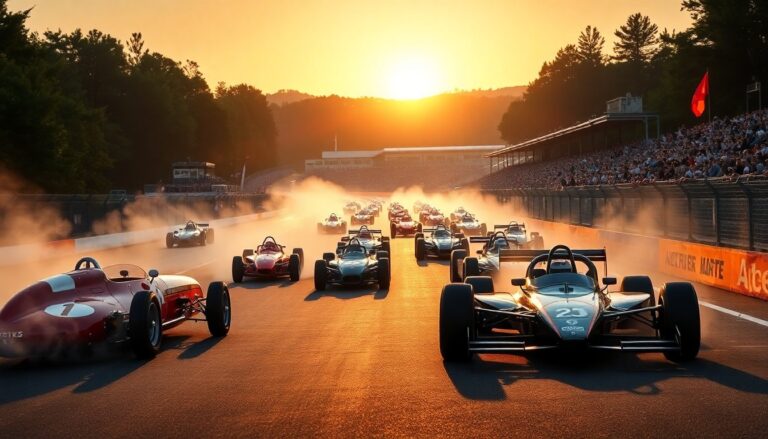Argomenti trattati
As motor racing enthusiasts prepare to celebrate a century of competition and innovation in the world of motor sport, reflections on its evolution are in order. From its early days with the launch of The Brooklands Gazette to its current status as a global phenomenon, the industry has experienced numerous changes, controversies, and triumphs. This article examines the legacy of Motor Sport magazine and highlights pivotal moments that have shaped the racing landscape.
Founded a century ago, Motor Sport magazine has been a crucial resource for racing fans, offering storytelling and insights into the sport. The publication consistently features stunning visuals, including captivating commissioned photography and archival images that bring historical events to life. Each month, readers enjoy a blend of nostalgia and contemporary racing narratives, showcasing the best of the sport’s past and present.
The power of imagery in motor sport
One of the most engaging aspects of Motor Sport magazine is its impressive collection of imagery. Each issue serves as a visual feast, highlighting moments that define the sport. In the November edition, for instance, readers were captivated by a stunning photograph of Camille du Gast, a pioneering female driver, dressed in Edwardian attire as she examined her De Dietrich 30CV from 1903. Such images evoke a sense of history while also emphasizing the evolution of racing technology and culture.
Future issues promise breathtaking photographs that capture the essence of racing, including a striking shot by photographer Jayson Fong that is sure to leave viewers on the edge of their seats. Additionally, a tribute to the legendary Jim Clark features an iconic moment from his unforgettable racing season in 1965, underscoring the magazine’s commitment to honoring motor sport’s rich history.
The legal battles shaping driver careers
As the sport evolves, so do the complexities surrounding driver contracts and team dynamics. Recently, McLaren Racing CEO Zak Brown found himself in the spotlight during a £15.5 million legal dispute with four-time IndyCar champion Álex Palou. This case revolves around Palou’s decision to remain with Chip Ganassi Racing, sparking debates about the economic implications of driver contracts. While McLaren claims significant financial losses due to Palou’s contract breach, the driver disputes these figures, asserting that they are exaggerated.
Implications for the future of contracts
The ongoing legal proceedings could have far-reaching consequences, potentially altering the structure of driver contracts in the future. As the racing landscape becomes increasingly competitive, drivers prioritize three key elements: a high-performing vehicle, robust team support, and compensation that reflects their market value. As teams navigate contract negotiations, it is evident that the traditional notion of a ‘number one’ driver is evolving into a more collaborative approach.
Embracing new technologies in racing
Innovation in motor racing continues with the introduction of alternative fuel technologies. Recently, Swedish rallycross star Kevin Hansen and Australian driver Molly Taylor made history by winning the first international motorsport event powered by hydrogen fuel cells, marking a significant milestone for the Extreme H FIA World Cup. This new racing series, a successor to the electric-powered Extreme E, showcases the potential of sustainable racing and the vision of its founder, Alejandro Agag.
The journey towards sustainable motorsport has been long, with initial announcements about the Extreme H concept raising skepticism about its viability. However, the successful debut event in Saudi Arabia reignited excitement and demonstrated the industry’s commitment to exploring greener alternatives.
Highlights from recent races
In addition to groundbreaking advancements, traditional events remain a staple of the racing calendar. Cadillac achieved back-to-back victories at the prestigious Petit Le Mans, with a team comprising Jack Aitken, Earl Bamber, and Frederik Vesti clinching the title at the 10-hour endurance race in Road Atlanta. Meanwhile, Porsche secured the IMSA manufacturers’ and teams’ titles, showcasing exceptional performance throughout the season.
Notably, Tom Ingram celebrated a significant achievement by becoming a two-time British Touring Car Championship (BTCC) champion, solidifying his status as a formidable competitor in the sport. These successes, alongside ongoing legal battles and technological advancements, illustrate the multifaceted nature of motor sport as it continues to evolve.

